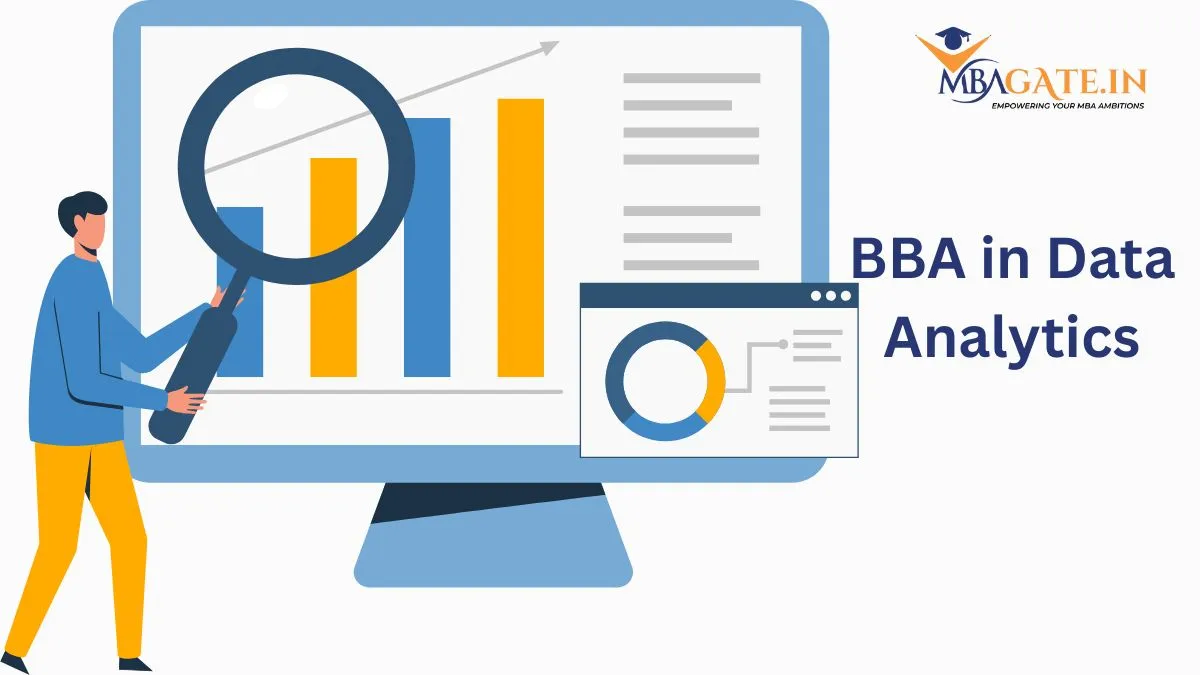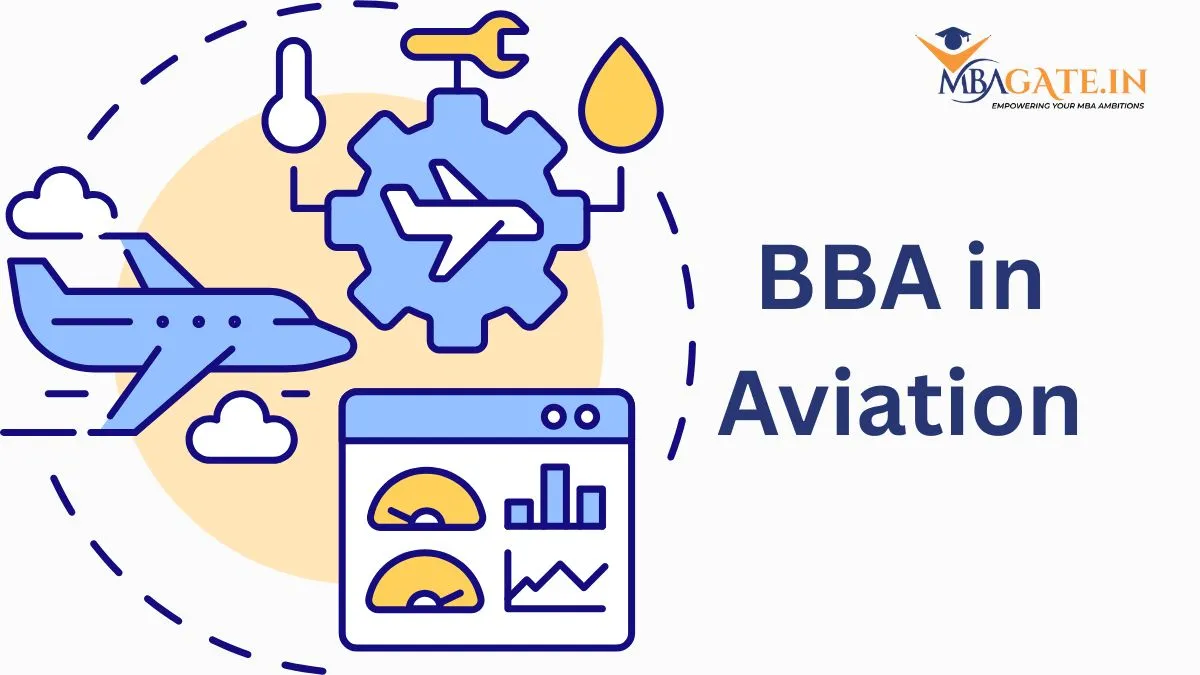BBA in FinTech: Benefits, Skill Developments, Entrance Examinations
Table of Content
-
- + more items Show less
The three-year undergraduate program Bachelor of Business Administration (BBA) in Financial Technology or BBA in FinTech is a study that offers a blend of finance, company management and emerging technology. It educates students about how emerging technologies, such as digital tools and technology such as Artificial Intelligence (AI), Blockchain, Big Data and mobile banking are shaping the financial arena. The program equips students for career opportunities in digital banking, online payment systems, investing technology and other technology-driven sectors of finance.
This syllabus equips students with a sound grounding in both traditional finance fields like financial management, accounting, and investing, and modern technologies needed in today's financial markets. Topics like financial markets, elementary coding, data analysis, risk management, blockchain and cryptocurrencies are addressed. Students also study regulatory guidelines, technology ethics and how to establish their companies using digital platforms.
With the ever-changing world around us, FinTech is growing immensely. With an increasing number of people utilising mobile banking apps, digital wallets and online investment portals, the need for skilled FinTech professionals increases. The BBA in FinTech course familiarises learners with real-world knowledge and practical skills to get ready for the future. Most institutions also include hands-on training, internships and industry projects to give students real-time experience.
FinTech is relevant in our current education system since it revolves around future job positions. Conventional finance jobs are being replaced or modified as a result of technological development. The BBA in FinTech curriculum equips students to work as financial analysts, blockchain advisors, digital bankers, data analysts and FinTech business founders. It is also a great option for students who want to create their finance-based tech services or even work in startups and innovation centres.
Another aspect for which a BBA in FinTech is important is that it supports the digital economy. With the world moving towards digital transactions and online finance, professionals with FinTech skills are much sought after. This course tries to do the bridge work between business and technology by making people who know both.
In the education field, a BBA in FinTech shows how a curriculum changes over a period of time. Colleges and universities are now more inclined towards practical skills, digital platforms and upcoming technologies. BBA in FinTech is just one instance of a course that prepares students for not only present-day careers but also future inventions.

Highlights: BBA in Fintech
Undergraduate students can enroll in a three-year BBA program in fintech. Candidates must have completed class 12 with 50% of the possible marks from recognised boards and schools in any field in order to be admitted to this course. CUET UG, NPAT, DUET, IPMAT and other exams are used by some colleges to admit students. On the other hand, entrance to certain colleges is determined by merit.
What is a BBA in Fintech?
BBA in FinTech is an undergraduate program of three years that learns finance and technology. It is a course that educates students about how today's technology is being applied to enhance financial services. It educates students about how digital tools are revolutionising banking, investing and money transactions.
This is the class where students are learning about financial systems, online banking, online payments, blockchain, cryptocurrency, data analysis. They’ve been given the fundamentals of coding, cybersecurity and mobile apps used in banking. It offers a rare combination of business and technology, which makes it distinct and very much career focused.
FinTech is a new and flourishing business sector. This comprises companies which cater to customers by providing financial services through tech like mobile wallets, the Unified Payments Interface (UPI), and investment and online banking apps. In this context, due to the widespread adoption of digital payments and online financial services, the need for talents with sound FinTech experience and knowhow becomes overwhelming.
The BBA in FinTech prepares students for careers at the cutting edge of technology and finance. It is an excellent choice for students who want an interest in the worlds of digital technologies and business. In other words,a BBA in FinTech study path prepares students to become the proffesionals of tomorrows future of finance through technology.
Subjects of BBA in Fintech
The undergraduate Fintech BBA program lasts three years. Six semesters comprise the course. Subjects covered in a BBA in Fintech include Fintech Innovations and Trends, Business Communication, Database Management Systems, Investment Analysis and Portfolio Management and Introduction to Information Technology.
Benefits of doing a BBA in FinTech
This subject educates students on how financial services are becoming digital, smarter and faster. It combines fields such as finance, technology and business in order to equip students to carry out contemporary work requirements.
One of the greatest advantages of this course is that it prepares students for their future careers. Banks, insurance firms and financial institutions today rely on digital tools to service their customers. Consequently, there is a growing need for individuals with a sound understanding of finance as well as technology. A BBA in FinTech can assist students in developing these skills.
Students learn about digital banking, online payments, mobile wallets, blockchain and cryptocurrencies. They learn about coding, data analytics and cybersecurity or financial regulation. This keeps them in line with the latest trends in the industry.
Another benefit is more career opportunities. Upon completion of the course, students can have careers as a financial analyst, data analyst, digital banking specialist, blockchain advisor or even start their own FinTech companies. The course also has internships and hands-on training, making it possible for students to gain real-world experience.
BBA in FinTech also develops problem-solving, communication and decision-making skills. These are useful soft skills applicable in many careers.
Skill Development after BBA in Fintech
Skill of Financial Analysis
Students are taught how to interpret the financial health of a company. They examine balance sheets, profit and loss accounts and cash flow statements. This makes children understand the flow of money in business and how to plan for profits. They can advise on sound tactics to save money or invest it for more returns.
Technical skills
Since technology plays such a vital role in FinTech, students are taught the basics. They understand how digital banking operates, along with how apps and websites are used to transfer money and invest. Basic programming languages or an introduction to financial software like Tally, QuickBooks and FinTech apps are taught in some courses. With this knowledge, they are able to work for digital banking, finance apps and tech companies.
Data Analysis and Interpretation
They learn to apply data to inform decisions. They employ tools like Excel, Power BI and fundamental SQL to gather and analyse client information, money spending and market trends.
This skill helps them know what customers desire, where money gets spent and how corporate performance can be enhanced.
Entrance Exam for BBA in Fintech
Several institutions and schools fund entrance examinations for BBA in FinTech courses. Entrance exams test students in subjects like English, Mathematics, Logical Reasoning and General Knowledge. A few of the most popular entry exams are the CUET, IPMAT, SET and university-level exams. Students who have passed Class 12th in any field may submit their applications. There are chances that some private universities might provide admission on the basis of Class 12 results or individual interviews as well.
BBA in Fintech: Eligibility
The candidate should have passed Class 12 (10+2) or an equivalent exam of a recognised board. It can be from CBSE, ICSE, state boards, or any other recognised education board. This is the minimum educational criterion.
Candidates from the commerce, science and arts streams are eligible. But it is not helpful if the subject is like maths, economics, business studies or computer science. These subjects make students understand the concepts of finance and technology included in the course.
Most of the universities demand 50% marks in Class 12. Some of the good universities can demand higher percentages (like 60%). For reserved categories (like SC/ST/OBC), the demand is decreased by 5%.
Certain universities require students to appear for admission exams like CUET (Common Universities Entrance Test), IPMAT (IIMs) and SET (Symbiosis) or their respective university-level exams. These exams evaluate English, Math, Reasoning and General Knowledge abilities.
Most of the colleges do not have stringent age requirements. Some might make it mandatory that the student is below 22 years of age at the time of admission. Having basic computer competence is good (but not mandatory).
After entry tests or shortlisting, some colleges can conduct a personal interview (PI) or group discussion (GD). This enables them to assess the student's confidence level, communication skills, and interest in FinTech.
Admission Process of BBA in Fintech
Verify that applicants should have passed Class 12 from a recognised board like CBSE, ICSE or state board. They must have attained a minimum percentage of marks (usually 50%). Certain colleges may accept candidates from any stream such as arts, commerce and science.
Look for some good colleges that offer BBA in FinTech. Look at their admission policy, fees, infrastructure, placements and the course structure. Make a list of colleges where they might want to apply.
Go to your college or university's site. Complete the online application form correctly – as per your name, contact information, marks of academic, and so on.
Please upload scanned copies of important documents, such as your Class 10 and 12 mark sheets, passport-sized photographs, signature and a valid ID proof (Aadhaar cards, etc).
Some of the universities make the students to attend the entrance exam. The tests assess candidates knowledge in English, mathematics, logical reasoning and general awareness. Prepare well and write the exam on that day.
After the exam or application process, the college will release the list of admitted students. This list may depend on your exam score, Class 12 marks or both.
Some colleges might extend an invitation to the next stage, which could be a personal interview (PI) or group discussion. They will evaluate applicants communication skills, confidence and passion for the FinTech sector.
If applicants go through all stages, they will get an official offer letter or selection letter from the college or university.
Lastly, visit the college (if required) and the applicant's original documents will be verified. After completion, applicants can join orientation or classes as per the academic schedule of the college.

BBA in Fintech: Top Colleges in India
After graduating from Class 12, candidates can enrol in a fintech BBA programme that lasts three to four years. The different universities that participate in Fintech. The names of some colleges, duration, fees and average salary are given in the table:
Career Prospects after BBA in FinTech
The students get the basics of business and the latest financial technologies. This course teaches them the information and skills required to work in the digital financial business. They are developed to handle a range of tasks and duties in FinTech organisations.
Future Scope
High Demand in the Job Market: Online banking, digital payments and financial apps are commonly used now. Therefore, companies need financial and technical knowledge.
With this course, students earn these skills when studying for a BBA in FinTech. Due to this, banks, financial institutions and FinTech companies have a high demand for them.
Their skills help companies grow in the virtual world.
Career Path Worldwide: FinTech is growing not just in India but also in most countries.
Digital payments, online banking and financial technology are being utilised by various multinational companies. Students undertaking a BBA in FinTech get technical knowledge and international finance knowledge. This allows individuals to find work overseas or seek employment at multinational companies. They can also work along with multinational FinTech startups or groups. Those who take this course get the chance to work anywhere in the world.
Employment in Finance & Technology firms: Most of the financial institutions are complementing their services nowadays using new technologies. Moreover, tech companies are starting to offer financial services such as money transfers and e-payments. Students who study BBA in FinTech learn both finance and technology to equip them for jobs in both fields. They can work in areas such as financial software, blockchain, cybersecurity and data analytics.
These jobs are interesting, contemporary and well-paid.
FAQs
A BBA in Fintech is a three to four-year undergraduate course. The candidate must have passed class 12 from a recognised university with 50% or more marks.
In a BBA in Fintech, internships are included. These internships provide students with hands-on experience, enabling them to apply their time management & discipline, communication skills and teamwork skills in real-life situations.
In a BBA in Fintech program, coding is generally not required. Basic knowledge of coding will be beneficial for the candidates.
A BBA in Fintech graduate can work in the banking sector. Fintech is a combined study of finance and technology. This course helps the candidates in various career opportunities. They can work in the banking sector in entry-level jobs like clerk and PO.









